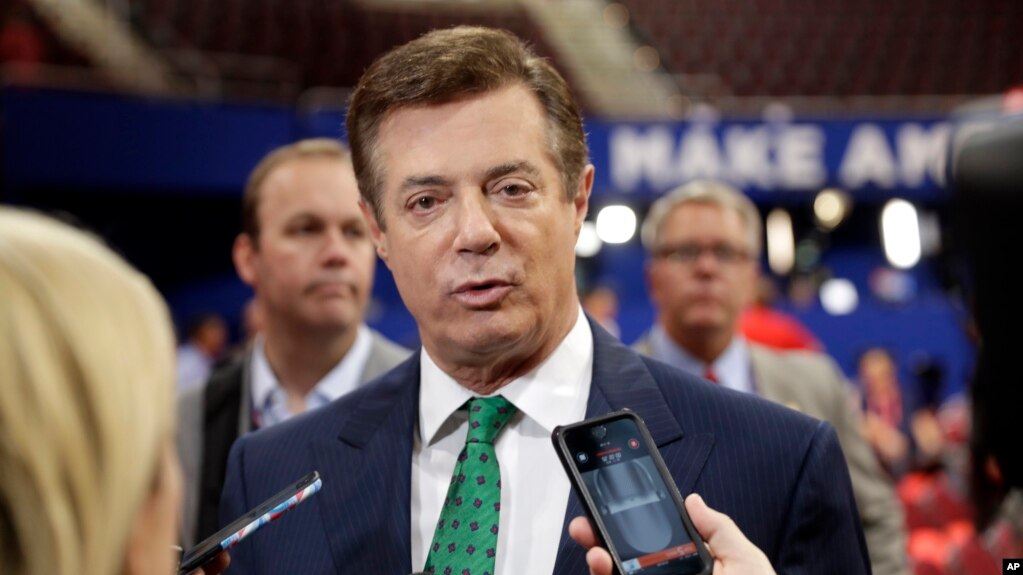 |
| Trump Campaign Chairman Paul Manafort talks to reporters on the floor of the Republican National |
Russia on Wednesday dismissed a New York Times report that members of U.S. President Donald Trump's campaign and other associates were in contact with senior Russian intelligence officials ahead of the November U.S. election.
The Times cited four current and former U.S. officials saying law enforcement and intelligence agencies intercepted calls and had phone records involving Trump's one-time campaign manager Paul Manafort and several other unnamed associates.
Manafort called the accounts "absurd," the Times said.
He also denied a similar CNN report that said Trump associates, including Manafort and now-resigned National Security Adviser Michael Flynn, were regularly communicating with Russian nationals before the election.
In Moscow, presidential spokesman Dmitry Peskov said Wednesday the report "is not based on any facts," while Russian media quoted the country's foreign intelligence service saying reports about the contacts were unfounded.
Foreign Ministry spokeswoman Maria Zakharova said at a briefing that Russian diplomats acted within normal practice for diplomats of all countries.
Flynn was ousted Monday after information became public about contacts he had with Russian Ambassador Sergey Kislyak ahead of Trump's inauguration last month.
The White House said Tuesday Trump was advised nearly three weeks ago that Flynn had misled Vice President Mike Pence about the conversation.
White House spokesman Sean Spicer said the president and his close advisers had been "reviewing and evaluating" that information on a "daily basis for a few weeks" before Flynn's resignation.
Ahead of the January 20 inauguration, Pence told CBS News' "Face the Nation" that Flynn and Kislyak did not discuss current U.S. sanctions against Russia for its role in the Ukraine crisis.
Pence also said Flynn and Kislyak "did not discuss anything having to do" with the Obama administration's decision in late December to expel dozens of Russian diplomats.The Russians were sent home in response to allegations of Russian cyber-spying against Democratic candidate Hillary Clinton during the 2016 presidential campaign.
Responding Tuesday to reporters' questions about the 18-day gap between the January 26 Trump briefing and Flynn's departure on Monday, Spicer said, "The president concluded he no longer had trust in his national security advisor."
Spicer also said Trump was pleased that Flynn had talked with the Russian diplomat, and said the president concluded there was nothing legally wrong with their discussions, even though Flynn was a private citizen at the time.
Misled vice president
Flynn acknowledged in his resignation letter that he had "inadvertently briefed" Pence and others with "incomplete information" regarding his phone calls with Kislyak in the weeks before Trump assumed power.
Even as the White House drama played out, Trump attempted to downplay its significance on Tuesday. He wrote on his Twitter account, "The real story here is why are there so many illegal leaks coming out of Washington? Will these leaks be happening as I deal on N. Korea etc?"
Key opposition Democratic lawmakers called for expanded investigations into links between Russia and Flynn and other key Trump aides, extending beyond the conclusion reached by the U.S. intelligence community last year that Russia interfered in the U.S. election.
"This. Is. Not. Normal," said Democratic Senator Elizabeth Warren, a vocal Trump critic.
After Flynn's resignation, Trump quickly named another retired Army general, Keith Kellogg, as his acting national security advisor, but also could pick former Central Intelligence Agency chief David Petraeus or former Navy Vice Admiral Robert Harward to fill the strategic position on a permanent basis.
The U.S. Justice Department, according to The Washington Post, warned the White House last month that Flynn had so misrepresented his conversations with the Russian envoy that he might be vulnerable to blackmail by Moscow, as a result of the contradictions between the public descriptions of the calls and what intelligence officials knew based on their routine monitoring of communications by foreign officials in the United States.
Flynn and Kislyak, according to widespread U.S. news accounts, discussed the sanctions Obama imposed on Russia late last year.
Pence and Trump aides, relying on information from Flynn, said publicly that Flynn had not discussed lifting the sanctions, which are still in place. Flynn later acknowledged the issue may have come up.
Conversations such as those between Flynn and Kislyak possibly could be a violation of a U.S. law that prohibits private citizens from conducting diplomatic affairs with a foreign government, because Trump had yet to take office. Spicer said the White House concluded it was not a legal issue involving Flynn's contacts with Russia, but rather his misleading assertions to Pence.
Spicer said trust in Flynn "eroded to a point that we felt we had to make a change."
Russian lawmakers said Flynn's quick departure amounted to an attack on attempts to improve relations between Moscow and Washington.
Leonid Slutsky, who heads the Duma's foreign affairs committee, said Flynn's resignation was a "negative signal."










No comments:
Post a Comment